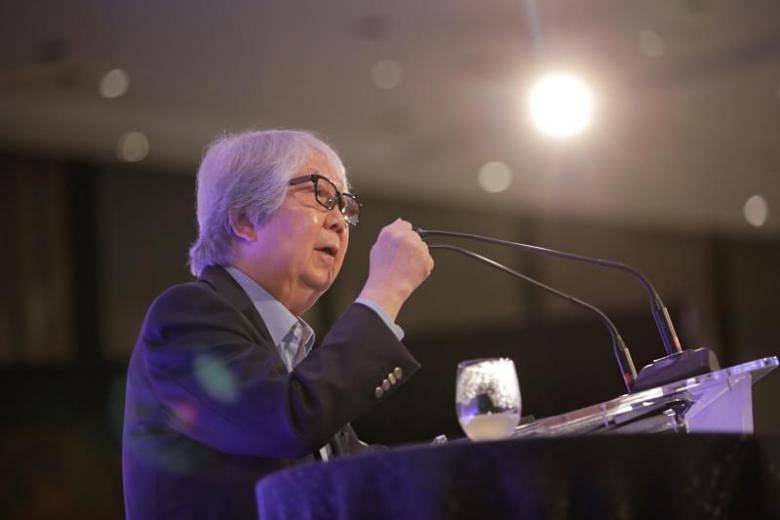SINGAPORE - As Singapore's fourth-generation leaders prepare to step up to the plate, two of their priorities should be to maintain racial and religious harmony and make Singapore a more equal society, said Professor Tommy Koh on Tuesday (Oct 1).
This includes looking into allegations of discriminatory hiring practices and working to make Singapore a classless society, he said.
"Today, Singapore is not a classless society. We are divided by wealth, by income, by profession, by place of residence, and even by the school we attend."
Prof Koh made this call at the Singapore Bicentennial Conference, as part of an eight-point agenda he had drawn up for the country's fourth prime minister and his team to consider.
He also hopes they will keep Singapore safe, establish a more caring and inclusive society and continue to grow the economy at a sustainable rate "in harmony with nature", with employers and the Government stepping in to help those who will be laid off as the economy restructures.
"We should not abandon the displaced workers because we don't want more and more Singaporeans to become Grab drivers or worse, to join the ranks of the angry voters," he said.
"Remember this: It was the angry voters who helped to elect President Trump in the United States. It was the angry voters in the United Kingdom who voted to leave the European Union."
The veteran diplomat also stressed that Singapore should elevate the importance of Asean in its economic agenda, as the regional grouping is the one bright spot in an otherwise gloomy global economic outlook.
This means investing and trading more with Asean countries, encouraging Singaporeans to learn an Asean language, and reorienting school trips, internships, and university exchange programmes towards Asean countries. "What we need is a whole-of-country reorientation to Asean," Prof Koh said.
In addition, Singapore must become a thought leader in the field of environment and development, in areas such as green technology and green finance. The Republic has lost its lead to countries such as Japan and South Korea in these areas, Prof Koh pointed out. "The reason is that we've become timid and risk-averse," he said, adding that more could be done to promote the use of solar energy and electric vehicles here.
To round off his speech, Prof Koh recounted an anecdote involving former foreign minister S. Rajaratnam and founding prime minister Lee Kuan Yew.
Mr Rajaratnam had suggested Mr David Marshall - Singapore's first chief minister and founder of the Workers' Party - for the post of Singapore's ambassador to France.
Mr Lee was taken aback by the proposal, given that Mr Marshall was their political opponent. But years later, he honoured Mr Rajaratnam for his magnanimity in victory.
Prof Koh urged Singapore's next-generation leaders to embrace this same virtue, noting that criticism should be welcomed as long as the critic loves Singapore.
"Guided by this virtue, the Government should not have banned Tan Pin Pin's film To Singapore, With Love. It should not have withdrawn the book grants from Sonny Liew and Jeremy Tiang," he said.
"Why? The contestation of ideas is a necessary part of democracy. We should therefore not blacklist intellectuals, artists, writers because they criticise the Government or hold dissenting views."
He added: "Singapore will languish if our lovers are uncritical and our critics are unloving. What Singapore needs is not sycophants but loving critics and critical lovers."
In his speech, Prof Koh acknowledged that times have changed significantly since the 1960s, when Singapore's founding leaders mobilised people and pushed through visionary development projects with no guarantee of success.
Singapore's success has naturally made it more cautious and conservative, he said.
"However, certain things are timeless. I would like to say that our fourth-generation leader must have fire in his or her belly," Prof Koh said. Such a leader must have courage, and must not be intimidated by domestic or external foes, he added.
"At the same time, a fourth-generation leader must be an independent thinker who is willing to go where no one else has gone before. To survive and prosper, Singapore should be a leader in innovation, not a camp follower."
Prof Koh said that he has "full confidence" in the ability, commitment and integrity of Singapore's 4G leadership. "They will inherit from their predecessors a Singapore which is a great success."
He added: "What is already very good can still be improved, and it is in this spirit that I dare to submit some ideas for the consideration of our fourth prime minister."


